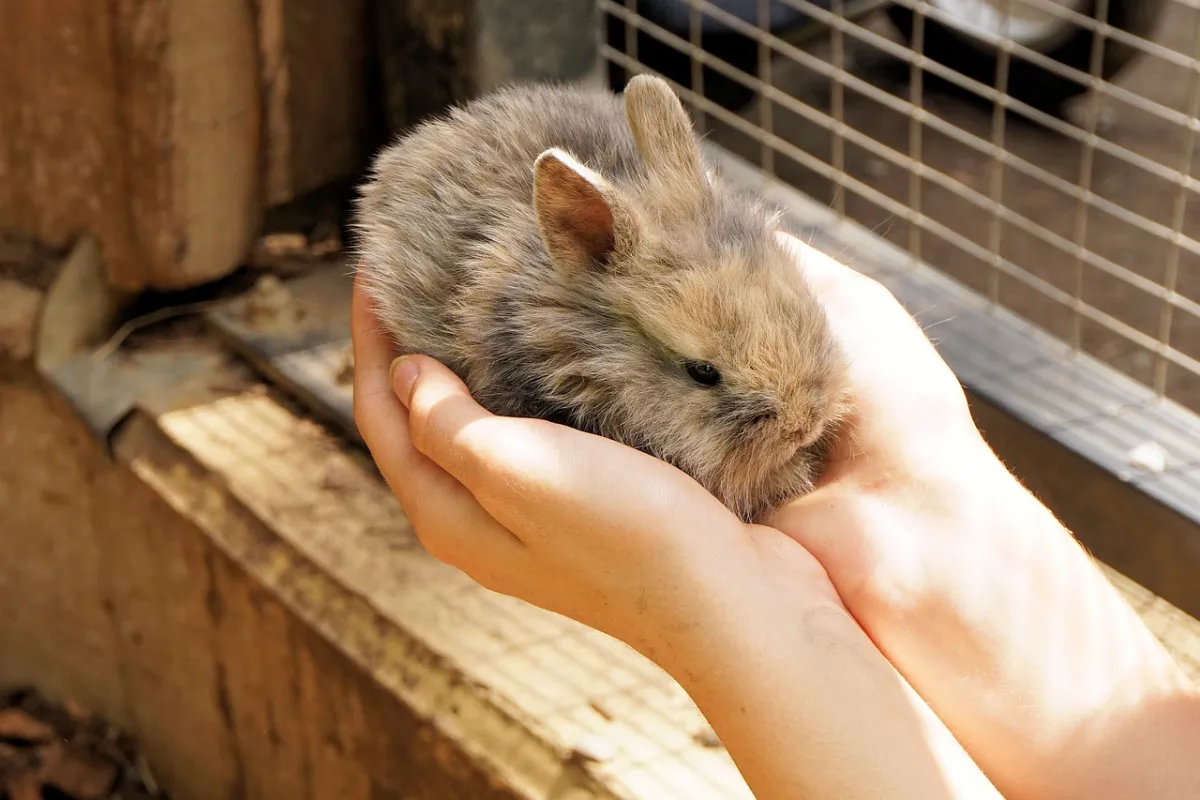Do you ever wonder if rabbits can really have heart attacks when they get scared?
In this article, we’ll explore the physiology of fear in rabbits and debunk the myth surrounding their cardiovascular health.
By understanding their fight or flight response and the impact of fear on their bodies, you can better recognize and manage stress in your pet rabbit.
So, let’s dive in and learn how to create a safe and stress-free environment for your furry friend.
In This Article
- 1 Key Takeaways
- 2 The Physiology of Fear in Rabbits
- 3 Understanding the Rabbit’s Fight or Flight Response
- 4 The Impact of Fear on a Rabbit’s Cardiovascular System
- 5 Debunking the Myth: Can Rabbits Actually Have Heart Attacks
- 6 Recognizing and Managing Stress in Pet Rabbits
- 7 Tips for Creating a Safe and Stress-Free Environment for Your Rabbit
- 8 Frequently Asked Questions
- 8.1 How Long Does It Take for a Rabbit’s Heart Rate to Return to Normal After a Scare?
- 8.2 Can Rabbits Develop Long-Term Cardiovascular Issues Due to Chronic Stress?
- 8.3 Are Certain Rabbit Breeds More Prone to Heart Attacks When Scared?
- 8.4 Can Rabbits Experience Psychological Trauma From Frightening Experiences?
- 8.5 What Are Some Signs That Indicate a Rabbit Is Experiencing Stress or Fear?
Key Takeaways
- Rabbits have a strong cardiovascular system and evolved to handle stressful situations without experiencing heart attacks.
- Fear rapidly affects a rabbit’s cardiovascular system, causing an increase in heart rate, temporary rise in blood pressure, and redirection of blood flow.
- Providing a safe and calm environment for rabbits helps them manage their fear and minimize exposure to stressors.
- Recognizing and managing stress in pet rabbits is important for their health and happiness, and can be done through establishing a consistent daily schedule, creating a safe environment, rabbit-proofing the home, and providing a calm and quiet space.
The Physiology of Fear in Rabbits
You should understand the physiology of fear in rabbits to better comprehend their reactions to scary situations. When rabbits encounter a threat, their bodies undergo a fight or flight response, similar to other animals. This physiological response is crucial for their survival. It involves the release of stress hormones like adrenaline, which prepares their bodies for action.
The heart rate increases, blood vessels constrict, and blood is redirected to essential organs. This response helps rabbits respond quickly to potential dangers.
Additionally, understanding the physiology of fear in rabbits can aid in stress management. By creating a safe and calm environment, minimizing exposure to stressors, and providing ample hiding spots, you can help rabbits cope with fear and reduce their stress levels.
Understanding the Rabbit’s Fight or Flight Response
When a rabbit encounters a perceived threat, its body automatically triggers the fight or flight response, which is essential for its survival. In stressful situations, rabbits exhibit specific behaviors that indicate their flight response. These behaviors include freezing, hiding, or fleeing from the perceived threat. Understanding the flight response in rabbits is crucial for their well-being, as it allows us to provide appropriate care and minimize stress in their environment.
Rabbits have a highly sensitive nervous system, which means they can easily become stressed or scared. Their flight response is a natural instinct that helps them avoid potential danger. When a rabbit feels threatened, it may exhibit behaviors such as running away, thumping its hind legs, or even biting if cornered. It’s important to create a safe and secure environment for rabbits to minimize their exposure to stressors and reduce the likelihood of triggering their flight response.
The Impact of Fear on a Rabbit’s Cardiovascular System
Understanding the flight response in rabbits is fascinating. It’s interesting to observe how fear rapidly affects their cardiovascular system, causing an immediate increase in heart rate. This increase in heart rate is a direct response to the surge of adrenaline released by the body in times of fear. Adrenaline, also known as epinephrine, is a hormone that prepares the body for a fight or flight response.
In the case of rabbits, fear triggers the release of adrenaline, which then acts on the heart, increasing its rate of contraction. This increased heart rate helps to deliver oxygen and nutrients to the muscles, preparing the rabbit to either run away from the threat or defend itself. Additionally, fear can also cause a temporary rise in blood pressure, as the blood vessels constrict to redirect blood flow to vital organs.
Understanding the effect of fear on a rabbit’s blood pressure and the role of adrenaline in their fear response provides insight into how these animals adapt and survive in their environment.
Debunking the Myth: Can Rabbits Actually Have Heart Attacks
Don’t believe the myth that rabbits can have heart attacks, as they are actually equipped with a strong cardiovascular system. Examining the link between fear and heart health in animals, it is important to explore the psychological effects of fear on rabbits.
While fear can have detrimental effects on the overall well-being of animals, including increased heart rate and blood pressure, rabbits have evolved to handle stressful situations without suffering heart attacks.
Their cardiovascular system is designed to handle intense physical activity, allowing them to escape from predators quickly. Additionally, rabbits have a unique ability to control their heart rate through their nervous system, enabling them to adapt to various situations.
Recognizing and Managing Stress in Pet Rabbits
If you want to ensure the well-being of your pet rabbit, it’s vital that you learn how to recognize and manage stress in them. Rabbits, like any other animals, can experience stress, which can have negative effects on their health and overall happiness. By understanding the signs of stress in rabbits, you can take the necessary steps to alleviate their discomfort and promote a calm and relaxed environment for them.
Here are some key signs to look out for:
- Changes in behavior: Watch for any sudden changes in your rabbit’s behavior, such as increased aggression, hiding, or excessive grooming.
- Loss of appetite: Stress can lead to a decreased appetite in rabbits. If your rabbit suddenly stops eating or shows a significant decrease in food consumption, it may be a sign of stress.
- Physical symptoms: Stress can manifest in various physical symptoms, including diarrhea, fur loss, or even decreased immune function. Keep an eye out for any unusual changes in your rabbit’s physical appearance.
Implementing relaxation techniques for rabbits can help alleviate their stress and improve their overall well-being. Here are some techniques to consider:
- Provide a safe and comfortable environment: Ensure that your rabbit has a quiet and secure space where they can retreat to when they feel stressed. This can be a separate room or a cozy hiding spot within their enclosure.
- Offer plenty of mental and physical stimulation: Engage your rabbit with toys and games that promote exercise and mental stimulation. This can help distract them from stressful situations and keep their minds occupied.
- Establish a routine: Rabbits thrive on routine, so try to establish a consistent daily schedule for feeding, playtime, and social interaction. This can help reduce their stress levels by creating a sense of predictability and stability.
Tips for Creating a Safe and Stress-Free Environment for Your Rabbit
To ensure a safe and stress-free environment for your rabbit, you should provide a comfortable hiding spot and engage them with stimulating toys and games.
Rabbit proofing your home is crucial to prevent any potential accidents or harm to your furry friend. Make sure to secure any loose wires, remove toxic plants, and block off any areas where your rabbit could get stuck or injured.
Additionally, creating a calm and quiet space for your rabbit is important for their well-being. Rabbits are prey animals and can easily become stressed or frightened by loud noises or sudden movements. Provide a peaceful area where they can retreat to when they feel overwhelmed. This could be a secluded corner or a cozy enclosure where they feel safe.
Frequently Asked Questions
How Long Does It Take for a Rabbit’s Heart Rate to Return to Normal After a Scare?
After a scare, a rabbit’s heart rate may take a few minutes to return to normal. Factors like the intensity of the scare and the rabbit’s overall health can influence the recovery time. Providing a calm environment and gentle reassurance can help the rabbit’s heart rate settle.
Can Rabbits Develop Long-Term Cardiovascular Issues Due to Chronic Stress?
Chronic stress can have long-term effects on a rabbit’s health, especially on its cardiovascular system. The impact of ongoing stress can lead to potential cardiovascular issues, highlighting the importance of providing a stress-free environment for rabbits.
Are Certain Rabbit Breeds More Prone to Heart Attacks When Scared?
Certain rabbit breeds may be more prone to heart attacks when scared due to their genetic predisposition for cardiovascular issues. It is essential to prioritize rabbit heart health and provide a safe, stress-free environment to minimize the risk of such incidents.
Can Rabbits Experience Psychological Trauma From Frightening Experiences?
Rabbits can experience psychological trauma from frightening experiences, which can have long-term effects on their overall health. Chronic stress can impact a rabbit’s well-being, so it’s important to create a safe and calming environment for them.
What Are Some Signs That Indicate a Rabbit Is Experiencing Stress or Fear?
If your rabbit is experiencing stress or fear, there are several signs to look out for, such as excessive grooming, loss of appetite, or hiding. To calm a scared rabbit, create a safe and quiet environment and offer gentle reassurance.





